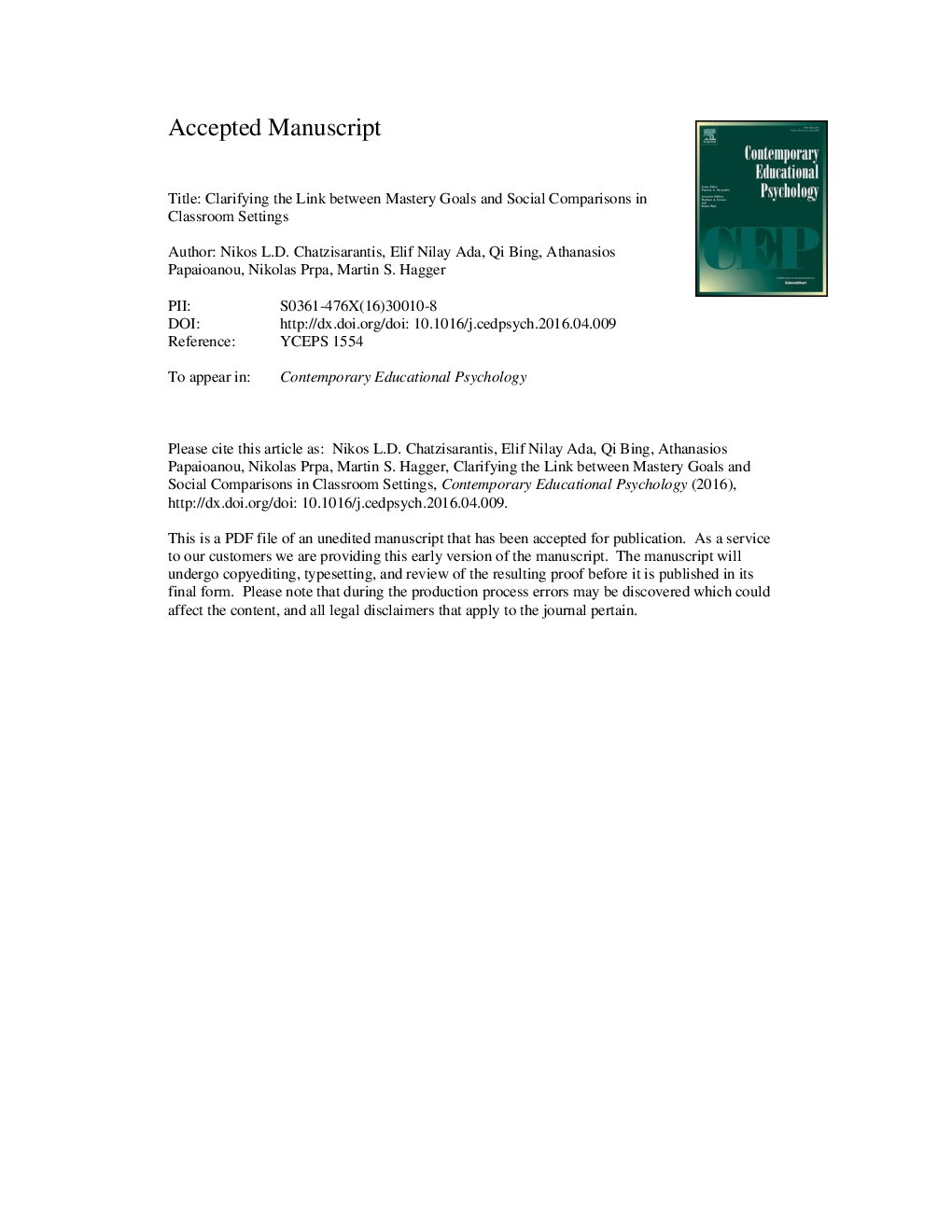| کد مقاله | کد نشریه | سال انتشار | مقاله انگلیسی | نسخه تمام متن |
|---|---|---|---|---|
| 6839773 | 618597 | 2016 | 47 صفحه PDF | دانلود رایگان |
عنوان انگلیسی مقاله ISI
Clarifying the link between mastery goals and social comparisons in classroom settings
ترجمه فارسی عنوان
تعریف لینک بین اهداف تسلط و مقایسه های اجتماعی در تنظیمات کلاس درس
دانلود مقاله + سفارش ترجمه
دانلود مقاله ISI انگلیسی
رایگان برای ایرانیان
ترجمه چکیده
مطالعات تجربی قبلی حاکی از آن است که ارزیابی صلاحیت ها عملکرد اطلاعات مقایسه ی اجتماعی در مورد نمرات همکلاسی ها حتی در میان دانش آموزان تسلط گرایانه است که نباید ادراکات شایستگی در مقایسه های اجتماعی را پایه ریزی کنند. این مطالعه با هدف تکرار این پیوند بین اهداف تسلط و مقایسه های اجتماعی با استفاده از معیارهای اهداف موفقیت انجام شد که استانداردهای مقایسه ای را که دانشجویان قصد داشتند در تنظیمات کلاس درس اتخاذ کنند، به دست آورد. علاوه بر این، ما بررسی کردیم که آیا دانش آموزان تسلط گرایانه و عملکردی گوناگون به مقایسه های اجتماعی پاسخ دادند، به ویژه مقایسه های نامطلوب اجتماعی با همسالان توانا تر. در یک مطالعه که با هدف پیش بینی ادراکات شایستگی در میان دانشجویان دانشگاهی انجام شد، نشان دادیم که دانش آموزان تسلط گرایانه که قصد پذیرش استانداردهای خود ارجاعی را بر روی درک شایستگی در مقایسه با مقایسه های اجتماعی دارند. علاوه بر این، تجزیه و تحلیل سطح پاسخ پشتیبانی از یک مزیت هدف تسلط ؟؟ در نتیجه اهداف تسلط، ادراکات بالاتری از شایستگی را نسبت به اهداف عملکرد در میان دانش آموزانی که در مقایسه های اجتماعی نامساعد قرار می گیرند، به ارمغان می آورد. یافته ها نشان می دهد که اهداف تسلط سازگار نیستند، زیرا آنها انگیزه دانش آموزان برای عدم مقایسه در اجتماعات را ندارند، بلکه به این دلیل که دانشجویان را به سوی مقایسه های اجتماعی نامساعد با سازگاری می دهند.
موضوعات مرتبط
علوم انسانی و اجتماعی
روانشناسی
روان شناسی کاربردی
چکیده انگلیسی
Previous experimental studies have documented that competence evaluations are function of social comparison information pertaining to classmates' grades even among mastery-oriented students who are not supposed to base perceptions of competence on social comparisons. This study aimed to replicate this link between mastery goals and social comparisons by using a measure of achievement goals that captured the comparison standards that students intended to adopt in classroom settings. In addition, we examined whether mastery-oriented and performance-oriented students responded differently to social comparisons, particularly unfavourable social comparisons with more capable classmates. In a study that aimed to predict perceptions of competence among university students, we showed that mastery-oriented students who intended to adopt self-referenced standards of comparison based perceptions of competence on social comparisons. In addition, response surface analysis supported a “mastery goal advantage” effect whereby mastery goals yielded higher perceptions of competence than performance goals among students who engaged in unfavourable social comparisons. Findings suggest that mastery goals are adaptive not because they motivate students to not engage in social comparisons but because they lead students to respond to unfavourable social comparisons in an adaptive way.
ناشر
Database: Elsevier - ScienceDirect (ساینس دایرکت)
Journal: Contemporary Educational Psychology - Volume 46, July 2016, Pages 61-72
Journal: Contemporary Educational Psychology - Volume 46, July 2016, Pages 61-72
نویسندگان
Nikos L.D. Chatzisarantis, Elif Nilay Ada, Qi Bing, Athanasios Papaioannou, Nikolas Prpa, Martin S. Hagger,
